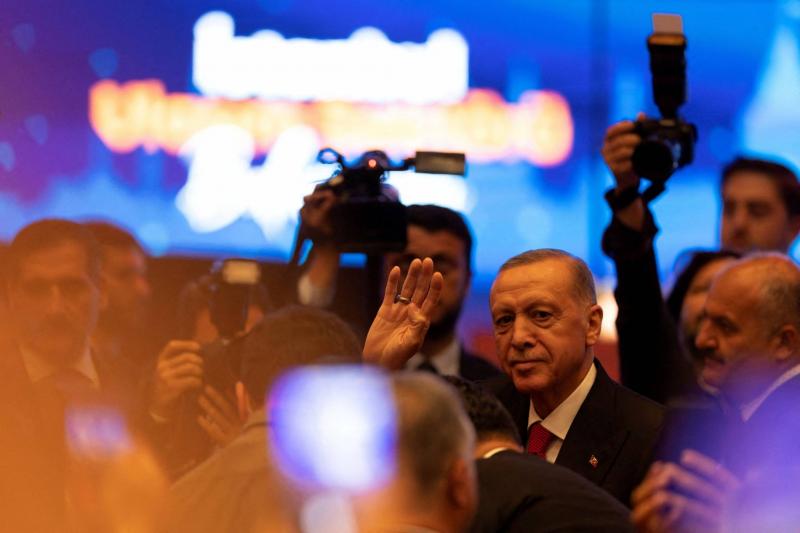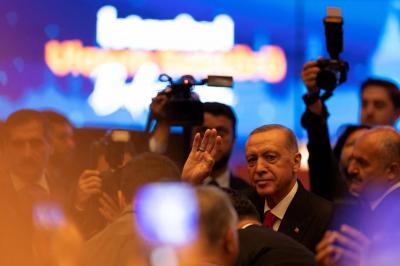Turkish President Recep Tayyip Erdoğan indicated yesterday that his newly appointed government will revert to more traditional economic policies with the appointment of Mehmet Simsek to address the cost of living crisis and other issues. Analysts suggest that Simsek's appointment as Minister of Treasury and Finance may pave the way for interest rate hikes in the coming months, marking a notable shift from Erdoğan's long-standing policy of lowering interest rates despite rising inflation.
After winning the presidential runoff election last week, Erdoğan (69), who has ruled for more than two decades, began his new five-year presidential term by urging Turks to set aside their differences and focus on the future.
The new Turkish government includes Cevdet Yılmaz, another traditional economist, as Vice President, and Hakan Fidan, the former head of Turkey’s intelligence agency, as Minister of Foreign Affairs, replacing Mevlüt Çavuşoğlu.
The swearing-in ceremony for Erdoğan took place at the presidential palace in Ankara, attended by high-ranking officials from various countries and international organizations, including NATO Secretary-General Jens Stoltenberg, Venezuelan President Nicolás Maduro, Hungarian Prime Minister Viktor Orbán, and Armenian Prime Minister Nikol Pashinyan.
This evident shift in economic policies occurs at a time when many analysts say Turkey, a large emerging market, is headed toward turmoil due to dwindling foreign reserves, an expanded government-backed deposit protection scheme, and inaccurate inflation forecasts.
Simsek (56) was highly regarded by investors when he served as Minister of Finance and Deputy Prime Minister from 2009 to 2018. Analysts note that, following previous instances when Erdoğan shifted to more traditional policies only to quickly revert to his interest rate reduction methods, much will depend on the degree of independence that Simsek will enjoy.
Emre Peker, a director at the Eurasia Group covering Turkish affairs, stated, "This indicates that Erdoğan has acknowledged the erosion of confidence in his ability to manage Turkey's economic challenges. However, while Simsek's appointment is likely to delay a crisis, long-term economic reforms are unlikely to be presented." He added that "Simsek is likely to have a strong mandate early in his term, but he will soon face strong political headwinds that will hinder policy implementation as local elections approach in March 2024."
Since 2021, Erdoğan’s economic program has emphasized monetary stimulus and aimed at credit to boost economic growth, exports, and investments, placing pressure on the central bank and undermining confidence in its independence. As a result, inflation soared to a 24-year high of 85 percent last year before declining. The lira has lost more than 90 percent of its value over the past decade after a series of crashes, the worst of which occurred in late 2021, falling to a record low of 20 lira against the dollar after the runoff election on May 28.
Erdoğan, Turkey’s longest-serving leader, garnered 52.2 percent of the votes in the runoff on May 28, contrary to most opinion polls predicting that economic pressures would result in his defeat. The new term will allow Erdoğan to continue increasingly authoritarian policies that have led to division within the NATO member country, but it will also enable him to strengthen Turkey's position as a regional military power.
During the swearing-in ceremony, Erdoğan spoke with a conciliatory tone. He stated, "We will encompass all 85 million citizens regardless of their political beliefs... Let's set aside the grievances of the election period. Let's look for ways to reconcile." He added, "We should look ahead together and focus on the future, trying to articulate new ideas. We must build the future by learning from the mistakes of the past."
While taking the presidential oath earlier, Erdoğan pledged to protect Turkey's independence and territorial integrity, commit to the constitution, and adhere to the principles of Mustafa Kemal Atatürk, the founder of the modern secular republic. Erdoğan became Prime Minister in 2003 after his Justice and Development Party won the elections in late 2002, following Turkey's worst economic crisis since the 1970s. In 2014, he became the country's first popularly elected president and was re-elected in 2018 after gaining new executive powers through a 2017 referendum.
The elections on May 14 and the runoff on May 28 were significant due to the opposition's confidence in ousting Erdoğan and changing many of his policies, including proposing sharp increases in interest rates to combat inflation, which reached 44 percent in April. In his speech after the victory, Erdoğan declared that inflation was the most pressing issue for Turkey.




